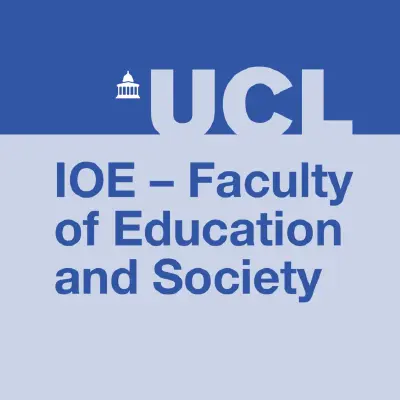
IOE insights
281 episodes Last Updated: Jul 04, 25
Thoughts and ideas on education, culture, psychology and social science to create lasting and evolving change from our academics, students, alumni and other brave thinkers. Brought to you by IOE, the world's leading centre for education and social science research, courses and teaching, and a faculty of University College London (UCL).
More from us: https://ucl.ac.uk/ioe
Episodes
What does supporting teacher wellbeing look like? And how can school leaders create a culture of wellbeing?Samantha O'Sullivan's research finds that teacher wellbeing is found in authentic recognition of their work, appropriate CPD, time to do the job well, good colleague relationships, and autonomy to make decisions for themselves.In other words, all things that leaders can influence for the better."Good leadership is what's supporting wellbeing... The core, the centre of it, is a culture of good strong leadership."Full show notes and transcript: https://www.ucl.ac.uk/ioe/news/2025/jul/wellbeing-dont-give-me-things-pretty-my-life-staffroom-s05e05
Professor Gill Wyness shares her expertise on the intricacies of university funding, the student finance system, and the ongoing efforts to ensure equitable access and attainment. Discover why the current funding model is under strain, how it impacts students from all backgrounds, and what urgent reforms are needed to secure the future of this vital sector. We also hear about the role higher education plays in fostering economic growth and social mobility.Full show notes and links: http://uclioe.info/4nohPrg
Professor Eileen Kennedy shares her experiences regarding the ethical dilemmas encountered in the co-design context, where research participants are actively involved.What unforeseen ethical challenges might surface as the research progresses?Could there be situations where obtaining participant consent is not enough? How should one proceed in such cases?In this podcast episode, Eileen and Hakan aim to explore these questions together.Full show notes: https://www.ucl.ac.uk/ioe/news/2025/jun/beyond-consent-ethical-dilemmas-co-design-research-research-ethics-s01e04
We explore the growing financial pressures on UK universities and what they mean for the future of higher education. From frozen tuition fees to the reliance on international students, the system is reaching a tipping point. But alongside the challenges, we highlight the research-driven solutions already emerging. Through expert insights and real-world stories, we uncover how universities are adapting and what sustainability could truly look like. Guests:Professor Gill WynessHend Aly and Heather RolfeProfessor Huw Morris
Jun 13, 2025
Embracing chaos: Creativity, agency and ethics in digital storytelling | Research Ethics
Dr Michelle Cannon joins Dr Hakan Ergül to explore the ethical dilemmas that arise when using digital technologies for creative work in the classroom.How do we strike a balance between guiding students in their storytelling while preserving their agency? What strategies can researchers employ to navigate the complexities of confidentiality, privacy, and consent in digital production?In this episode, they discuss how digital tools can empower students, fostering creativity and amplifying their voices without compromising their autonomy.Full show notes and transcript: https://www.ucl.ac.uk/ioe/news/2025/jun/embracing-chaos-creativity-agency-and-ethics-digital-storytelling-research-ethics-s01e03
Evelyn Forde shares her lived experience, from not feeling she mattered in school to becoming headteacher of the year.Evelyn tells Mark and Elaine about finding her way back into education, after feeling like she didn't belong and was disillusioned with school.She talks about the importance of making both children and adults feel like they matter – which is shaped by one's actions, behaviour and attitudes.Cultivating this sense of belonging is integral to Evelyn's practice as an educator and a leader."It's about nurturing leadership without bias, being yourself and just being nice."Full show notes and transcript: https://www.ucl.ac.uk/ioe/news/2025/jun/making-sure-everyone-matters-evelyn-forde-tells-herstory-staffroom-s05e04
May 30, 2025
Empowering agency: Collaborating with children in the context of migration | Research Ethics
Dr Sara Young reflects on her experiences collaborating with children in the context of migration.How feasible is it to uphold ethical principles amid the uncertainties of the field?Taking the participants' vulnerability into account, what ethical considerations should be made both before and during fieldwork to ensure that children are actively included as co-researchers?Sara shares her valuable suggestions and insights on ethics, in conversation with Dr Hakan Ergül.Full show notes: https://www.ucl.ac.uk/ioe/news/2025/may/empowering-agency-collaborating-children-context-migration-research-ethics-s01e02
Sarah and Phoebe from Freshwater Theatre show how drama builds creativity and empathy... and can improve wellbeing for teachers too.Sarah and Phoebe explore how drama can be a vehicle for teachers to enhance lessons and deepen learning – but also a way to inject fun into the classroom, for both students and the teachers themselves.They talk about how drama can enable teachers to have more agency over what they teach and how they teach it, especially when it comes to adapting their curriculum to the needs of their pupils and their communities."Drama is the best multi-tool you'll find. It's really malleable.. and can bring people and teachers joy alike."Full show notes and transcript: https://www.ucl.ac.uk/ioe/news/2025/may/has-creativity-gone-out-fashion-no-its-more-important-ever-staffroom-s05e03
What ethical questions does working with young children raise? A conversation with Dr Karen Wilkes.How should researchers approach collaborating with children in creative ways to ensure the research is beneficial for all involved?In this conversation, Karen discusses her thoughts and experiences on research ethics, offering advice to researchers working with children on ethics preparation prior to fieldwork.Karen shares insights from her recent research on the societal repercussions of rapid gentrification in London, aiming to document the transformations through the eyes of primary school students.Full show notes: https://www.ucl.ac.uk/ioe/news/2025/may/working-withfor-children-documenting-social-change-research-ethics-s01e01
Julie Dockrell talks to us about how oral language is the foundation for all other learning and what the implications of this are for teachers.Julie talks about how her research aims to help children develop a flexible use of language across different contexts, for instance through a programme that supports children's conversational skills.She explores the importance of developing children's inference skills and oral comprehension by encouraging children to talk about and understand the texts they're reading.Julie also discusses the different types of multilingual classrooms and how teachers can address the challenges of teaching when there are many different languages in a classroom – though she also emphasises the importance of acknowledging the diversity of languages and translanguaging in particular.Full show notes, links and transcript: https://www.ucl.ac.uk/ioe/news/2025/feb/if-we-dont-create-opportunities-talk-we-build-disadvantage-staffroom-s05e02